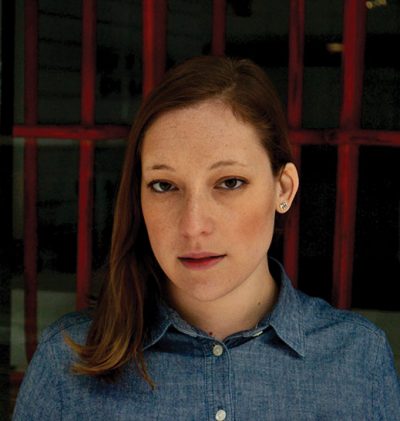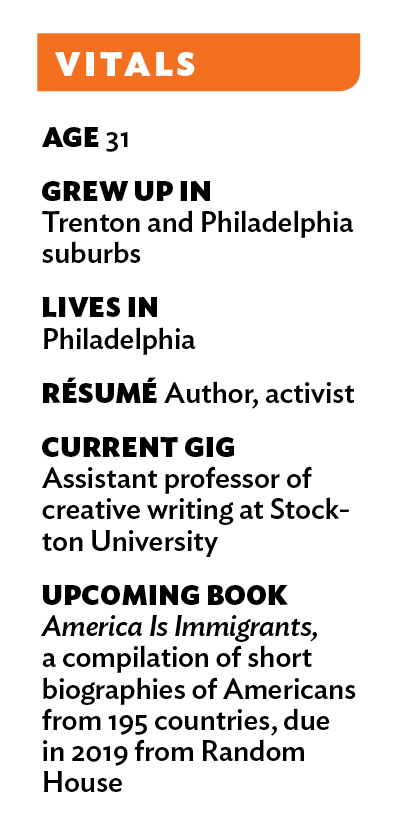
New Jersey Monthly: Wikipedia describes you as a “deaf-rights activist.” What does your activism look like?
Sara Novic: It’s a lot of yelling on the Internet, as activism tends to be these days. For me, there’s a big writing element to it. I write op-eds, and I visit a fair amount of deaf schools to talk to students about why reading and writing is important. I was also writing a lot of letters to Senators when the House passed HC 620 earlier this year. It basically guts the Americans with Disabilities Act. [Democratic opposition ultimately blocked the bill from reaching the Senate floor.]
NJM: Were you born deaf?
SN: No. I don’t know how old I was when I lost my hearing because you don’t notice it at first. I was maybe 12 when I started failing the school hearing tests, but when you fail, they sometimes think it was because of allergies or a cold, so you do a retest. I found in the nurse’s office during retests that I could see through the curtain the right buttons to press to pass. So I cheated for a while.
NJM: Why did you cheat?
SN: I didn’t know any deaf people at the time and I was embarrassed. Our society said it’s something that’s not normal, and for a long time that’s what I thought.
NJM: Sitting here, talking to you, it’s impossible to tell that you’re deaf.
SN: People say that a lot. I wouldn’t consider it a blessing, though. It’s nice that I don’t have the typical deaf accent because it makes it easier for me to communicate, on the one hand. On the other, people don’t make an effort to accommodate me the way they would some other deaf people. People assume I’m a bitch because I’ll be having a face-to-face conversation, and then I’ll turn around and they’ll keep talking, and I won’t respond. I’ve had to learn to advocate for myself, which is hard, because I’m super shy and introverted.
NJM: Your 2015 debut novel, Girl at War, is about a 10-year-old girl whose life is upended by the civil war that resulted in the dissolution of Yugoslavia. I understand you wrote most of it on commuter trains.
SN: When I went to grad school at Columbia, I was living in Philly and commuting, so I wrote a lot of it on NJ Transit’s Northeast Corridor line. I started writing it earlier, when I was at Emerson College in Boston as an undergraduate. At that time I’d do a lot of writing on Amtrak. Amtrak trains have tray tables, which gives them the edge over NJ Transit.
 NJM: Now you’re commuting from Philly to Stockton University, in Galloway, to teach. What’s that like?
NJM: Now you’re commuting from Philly to Stockton University, in Galloway, to teach. What’s that like?
SN: I’m in my second year. It’s a weird mix of people. The school is going through a lot of changes and getting bigger. I have a lot of good students. This semester I’m doing a novel-writing workshop. No one at Stockton has ever done that before, so it could be the best thing ever or a huge dumpster fire; we’re not sure yet.
NJM: You and your husband, Zach Stone, a producer and morning-show personality at WXTU-FM in Philadelphia, just got married in January, right?
SN: We got married at City Hall in Philadelphia. It’s kind of weird that he’s on the air, because who knows what he’s saying? I don’t. Which makes it the perfect job.
NJM: You’re currently working on America Is Immigrants, which will comprise short profiles of Americans from 195 countries. Any from New Jersey?
SN: Yes. Ukrainian Selman Waksman discovered several antibiotics while at Rutgers. Tadeusz Kościuszko was a Polish-born volunteer for the Continental Army in the Revolutionary War, and one of his early tasks was building fortifications in New Jersey along the Delaware. And Gideon Sundback, who was Swedish, is often credited for his work inventing the zipper at the Universal Fastener Company in Hoboken.
NJM: What’s your favorite memory from growing up in Trenton?
SN: We used to go to Ocean City for two weeks every summer when I was a kid. There was a bookstore there, and the lady who ran it would let me trade books. I’d read one and bring it back and exchange it. I read so many books in Ocean City. I’m not sure if she’s still there, but I’d like to give a shout-out to that lady.
